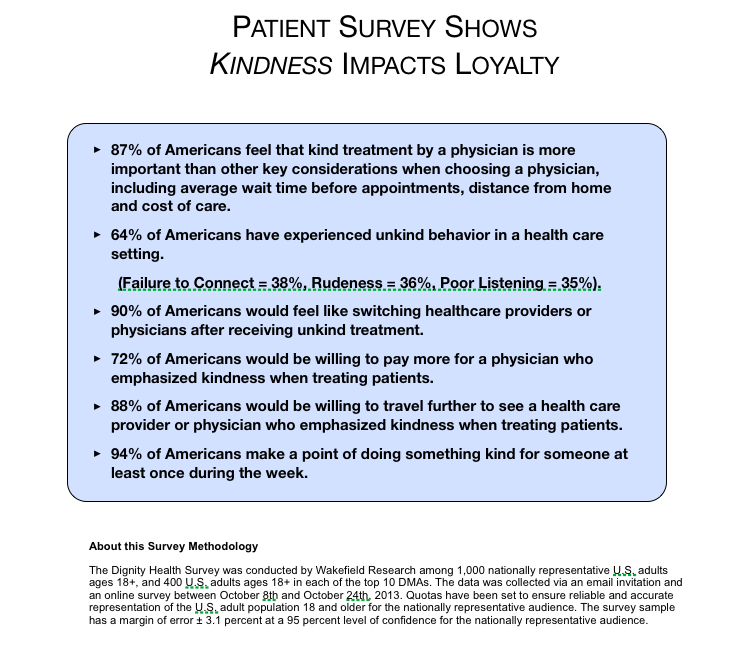 If you don’t think the human side of healthcare matters, just ask a woman why she left her ob/gyn. I can pretty much guarantee it wasn’t because of any clinical error. No, it usually has to do with a feeling.
If you don’t think the human side of healthcare matters, just ask a woman why she left her ob/gyn. I can pretty much guarantee it wasn’t because of any clinical error. No, it usually has to do with a feeling.
Loyalty Drops Based On Patients’ Feelings
Earlier this year, I was on the hunt for a new ob/gyn. The doctor I was seeing at the time was good at her job and well-respected in the community. But every time I called the office I could never get the appointment time I wanted. Now, to be honest, I didn’t really hold that against them because really, I’m not the Queen of England. My schedule isn’t any more or less busy than anyone else’s. So I could accept a little inconvenience with scheduling.
But then when I finally made it to my appointment, I always felt rushed. This is the third state I’ve lived in over the last eight years and I don’t really feel like any doctor has a true picture of my (relatively uncomplicated) but still important medical history. Not to mention, I really don’t know many doctors or practices in the area very well. There was nothing my doctor did or said specifically that I could point to as the reason for my dissatisfaction.
It just didn’t feel right.
Referrals Are Powerful (Especially From A Woman)
So I was on the hunt for a new doctor. And the first person I turned to was a girlfriend.
Anecdotally, this is who most women turn to when they need a recommendation for a doctor. Word of mouth is so much more powerful than anything you’ll find on a web page. Also, I can tell you from a lifetime of experience that women talk to other women about these kinds of things way more than men do with each other. Not sure why. Maybe because we’re more talkative in general? Maybe it’s a mom thing? Who knows. The bottom line is if women don’t like their doctor, you can bet they’re telling all their girlfriends.
Interestingly, the first thing this friend told me was how much she hated her previous ob/gyn. At first I wondered if she had heard my question correctly, but then I realized she was giving me ALL OF THE INFORMATION – not just the info I’d asked for. This amazing friend not only intended to give me her best recommendation. She also wanted to protect me from the “bad doctors” by giving me the scoop on the doctors in our area along with info on which doctors to avoid (and why).
I called the doctor she recommended and was able to get an appointment within a few weeks. The front desk reception staff was warm and welcoming and the waiting area was nothing fancy, but it made me feel more at ease. Wish I could pinpoint exactly what it was, but really it was just a feeling.
The nurse brought me back to the exam room where she took my vital signs, asked me some questions, and walked thru the new patient paperwork with me. And then she told me the doctor would like to meet with me first, in her office, prior to my initial examination.
A Warm Handoff and A Warm Welcome Puts Patients At Ease
I had never met with a doctor in their office before and I admit I was a little intimidated at first. But the nurse walked me down the hall and created what we call a “warm handoff” by introducing me by name to the doctor and handing me over to her care.
The doctor shook my hand, welcomed me into her office and invited me to sit down. She began by thanking me for coming in and for agreeing to meet with her before the exam. She told me she likes to set aside a small block of time for all new patients so she can get to know them individually first before jumping right into an exam. Even though I know it’s not true, this gesture of kindness and genuine connection left me feeling like I was her only patient.
She asked me some personal health questions and I’m telling you if she wasn’t completely captivated by my answers she could have fooled me. If nothing else, this woman is an expert listener. We chatted back and forth for about fifteen minutes. When we finished. she thanked me and then walked me back to the exam room to begin the clinical exam.
Build Loyalty By Elevating the Human Side of Healthcare
This is the human stuff.
This is the mushy side of healthcare. The soft side that many dismiss as being unimportant or insignificant. But it’s the side I need the most. And I suspect many other patients share a similar feeling.
In fact, this isn’t just anecdotal. There’s real evidence to support the notion that patients want to feel their doctors, nurses, and caregivers are listening to them and that they understand them.
A 2015 Dignity Health survey conducted by Wakefield Research found kindness has a profound impact on loyalty.

The biggest statistic that jumps out to me from this chart is that 90% of those surveyed said they would consider switching healthcare providers if they received what they perceived as unkind treatment. Kindness matters.
The human side of healthcare absolutely matters. Especially when you see data on how kindness and the connections patients feel with their doctors or nurses translates to loyalty. It’s more than just a nice thing to do. Its a feeling that patients say they must have and if it’s missing they’ll take their business elsewhere. Just like I did.






Leave A Comment